Complete Solutions to Objective Question of chapter LAWS OF MOTION of Class 11 book with complete answers and questions
| Class 11 | PHYSICS |
| Chapter | LAWS OF MOTION |
| DC PANDEY | Objective Question |
| Number Of Questions | 32 |
| Academic Year | 2023-24 |
In the system shown in figure all surface are smooth.Rod is moved by external agent with acceleration `9 ms^(-2)` vertically downwards.Force exerted on the rod by the wedge will be
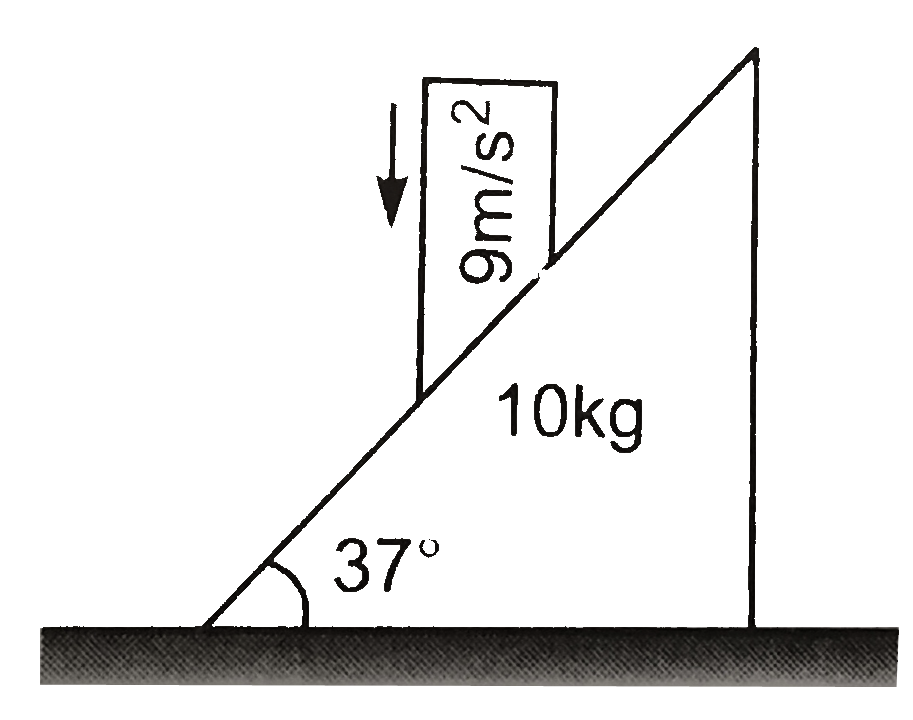 03:26View Solution
03:26View SolutionA thin rod of length `1 m` is fixed in a vertical position inside a train, which is moving horizentally with constant acceleration `4 ms^(-2)`.A bead can slide on the rod and friction coefficient between them is `0.5`. If the head is released from rest at the top of the rod , it will reach the bottom the in
03:21View Solution`Mr. X` of mass `80 kg` enters a lift and select the floor he wants .The lift now acceleration upwards at `2 ms^(-2)` for `2 s` and then moves with constant velocity .As the lift approaches his floor ,it decelerates at the same rate as it previously accelerates .If the lift cabes can safely withstant a tension of `2 xx 10^(4) N` and the lift itself has a mass of `500 kg` ,how many `Mr.X' s` could it safely carry at one time?
04:21View SolutionA partical when projected in vertical plane moves along smooth surface with initial velocity `20 ms^(-1)` at an angle of `60^(@)` , so that its normal reation on the surface remain zero throughout the motion. Then the slope of the surface at height `5 m` from the point of projection will be
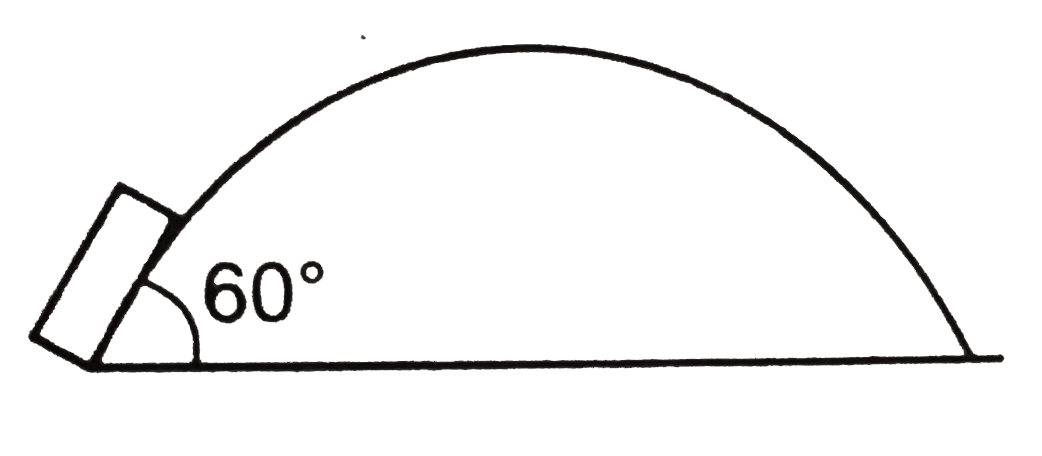 04:50View Solution
04:50View SolutionTwo block `A`and `B` each of same mass are attached by a thin inextensible string an ideal pulley .Initially block `B` is held in position as shown in figure.Now , the block `B` is released. Block `A` will slide to right and hit the pulley in time `t_(A)`. Block swing and hit the surface in time `t_(B)`. Assume the surface as frictionless ,them
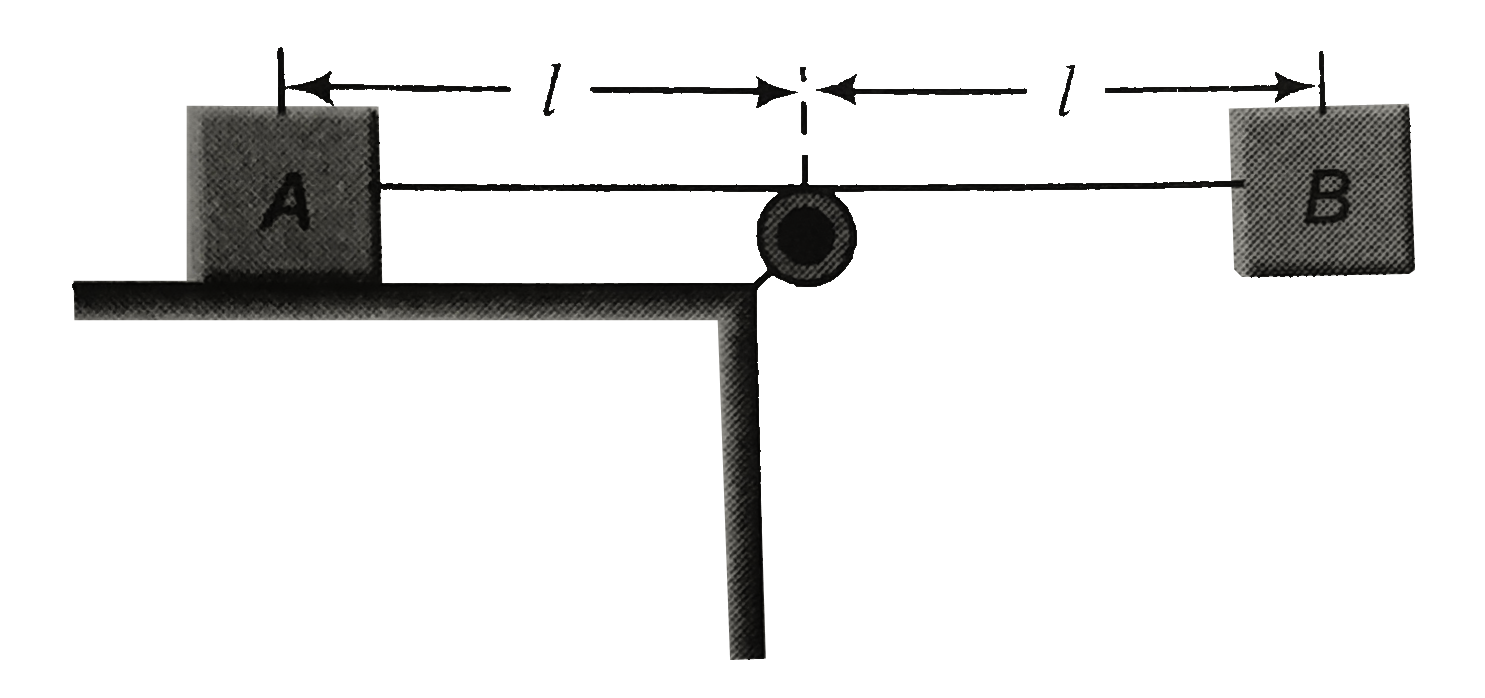 02:38View Solution
02:38View SolutionThree blocks are kept as shown in figure Acceleration of `20 kg` block with respect to ground is
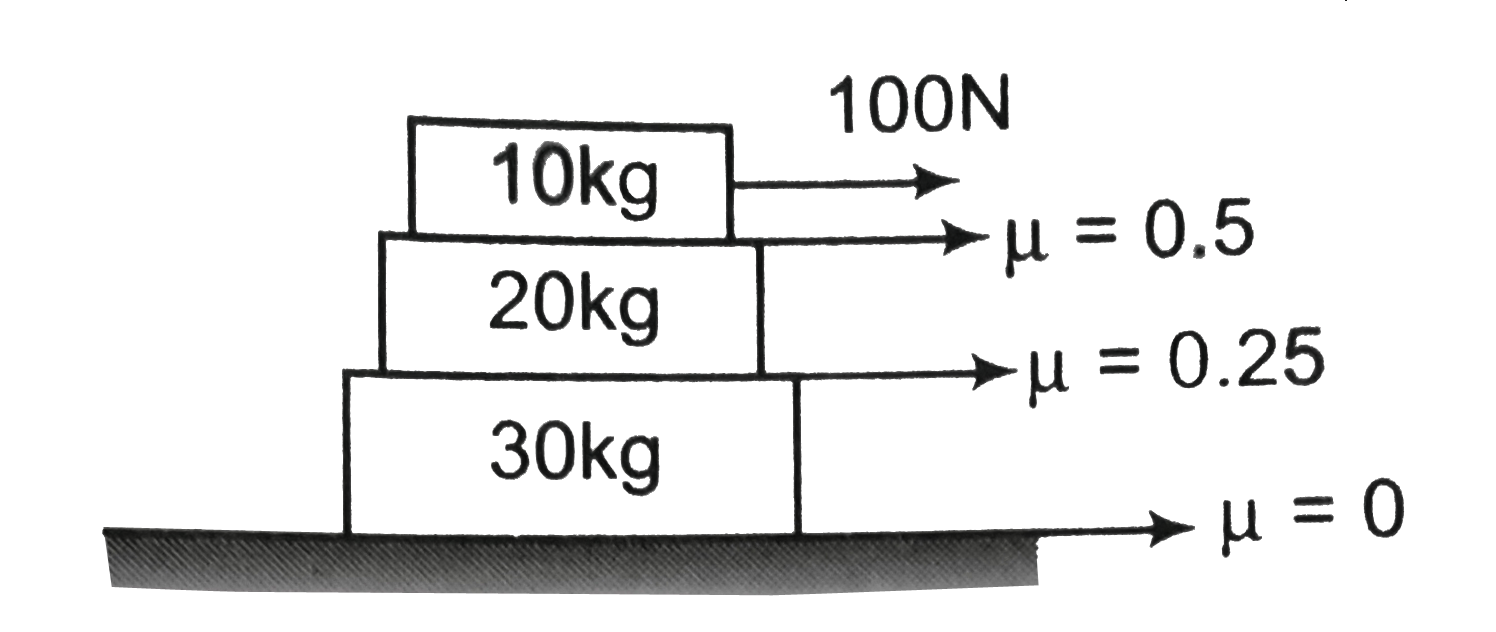 07:56View Solution
07:56View SolutionA sphere of redius `R` is ibn contact with a wedge. The point of contact is `( R)/(5)` from the ground as shown in figure.Wedge is moving with velocity `20 m s^(-1)` towards left then the velocity of the sphere at this instant will be
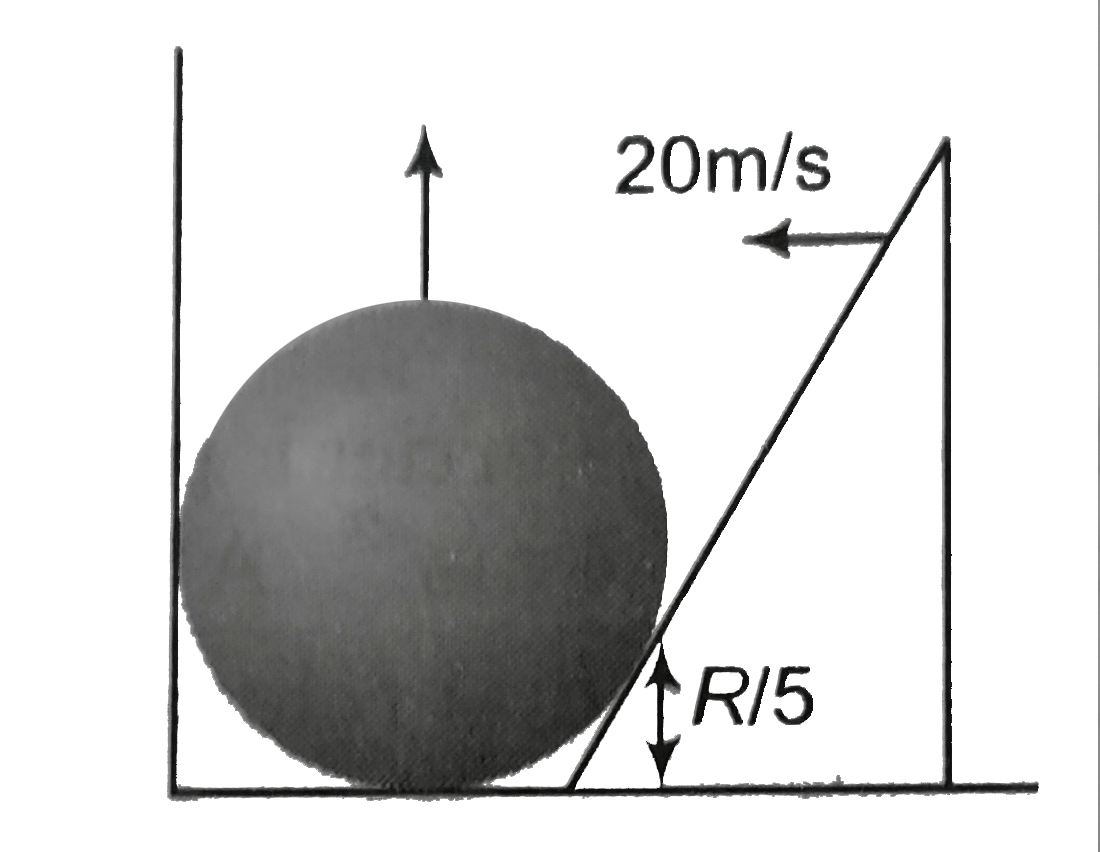 04:04View Solution
04:04View SolutionIn the figure it is shown that the velocity of lift is `2 m s^(-1)` while string is winding on the motor shaft with velocity `2 m s^(-1)` and shaft `A` is moving downward with velocity `2 m s^(-1)` with respect to lift , then find out the velocity of block `B`
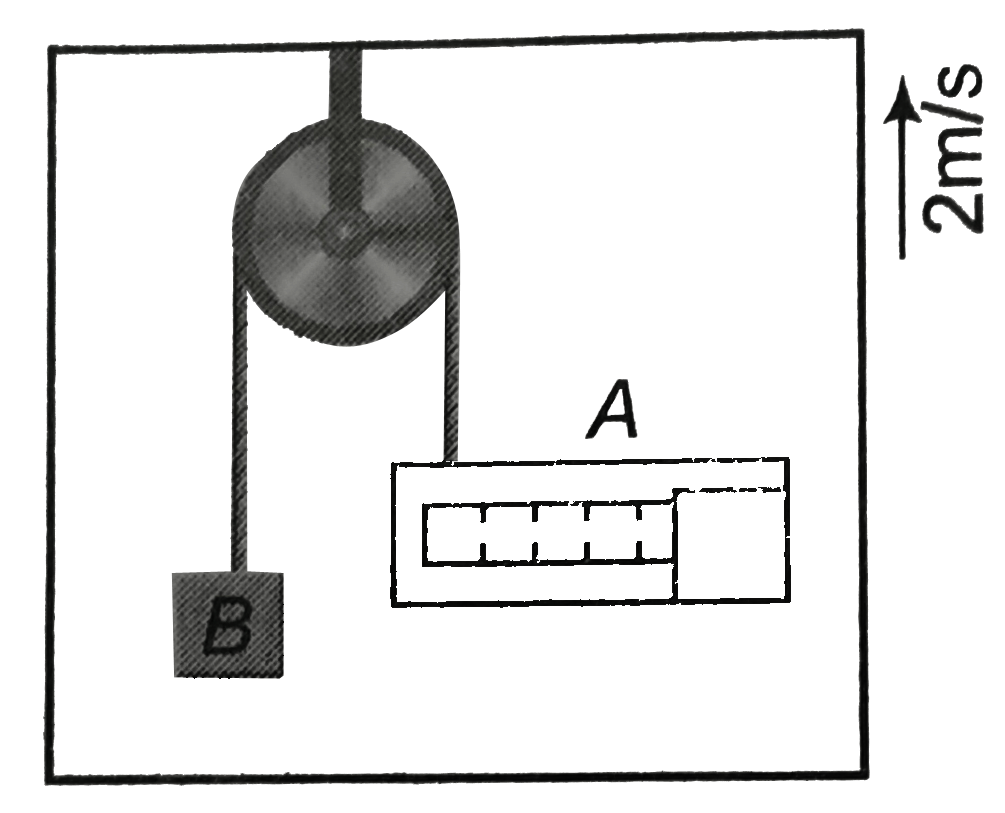 03:54View Solution
03:54View SolutionA monkey pulls the midpoint of a `10 cm` long light inextensible string connecting two identical objects `A` and `B` lying on smooth table of masses `0.3 kg` continuously along the perpendicular objects of line joining the masses .The masses are found to apporoach each other at a relative acceleration of `5 m s^(-2)` when they are `6 cm` apart .The constant force applied by monkey is
05:28View SolutionIn the figure shown the block `B` moves with , velocity `10 ms^(-1)`. The velocity of `A` in the position shown is
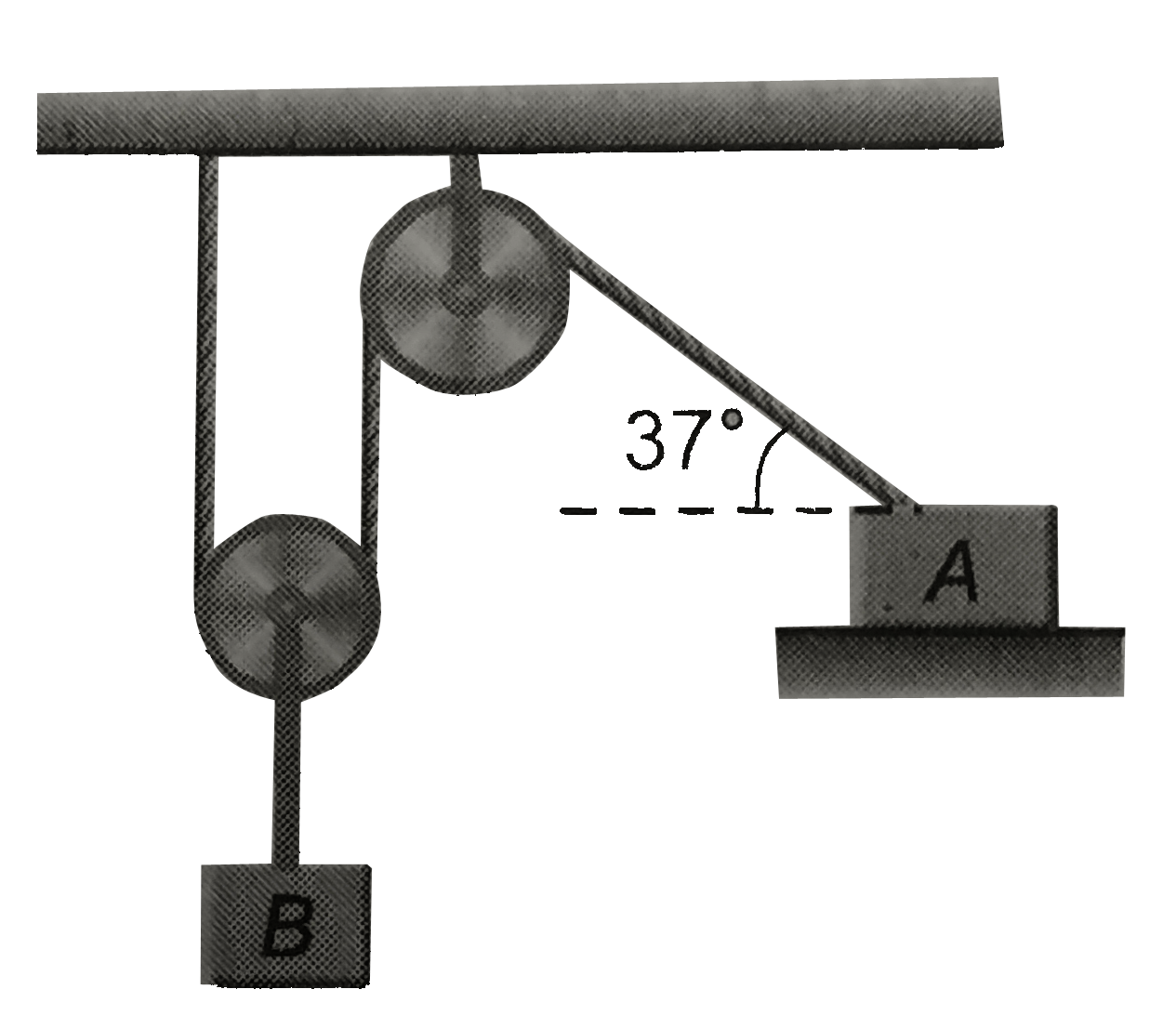 04:52View Solution
04:52View SolutionIn the figure `m_(A) = m_(B) = m_(C) = 60 kg`. The coefficient of friction between `C` and ground is `0.5 B` and ground is `0.3, A` and `B` is `0.4. C` is pulling the string with the maximum possible force without moving. Then the tension in the string connected to `A` will be
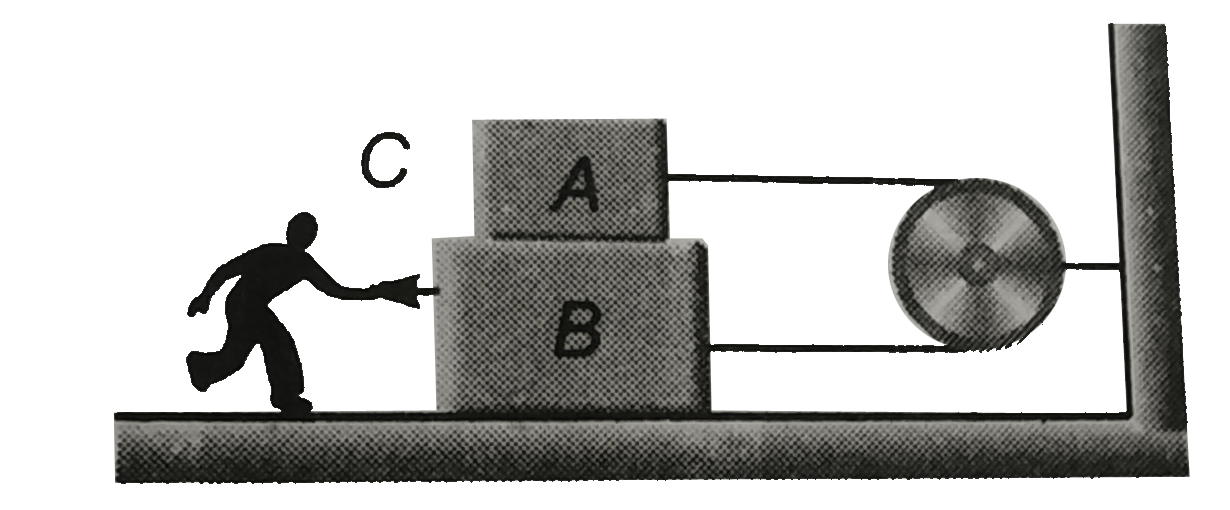 05:49View Solution
05:49View SolutionIn the figure shown the accelerationof `A` is `a_(A) = (15 hati + 15 hatj)`. Then the acceleration of `B` is (A remain in contact with B)
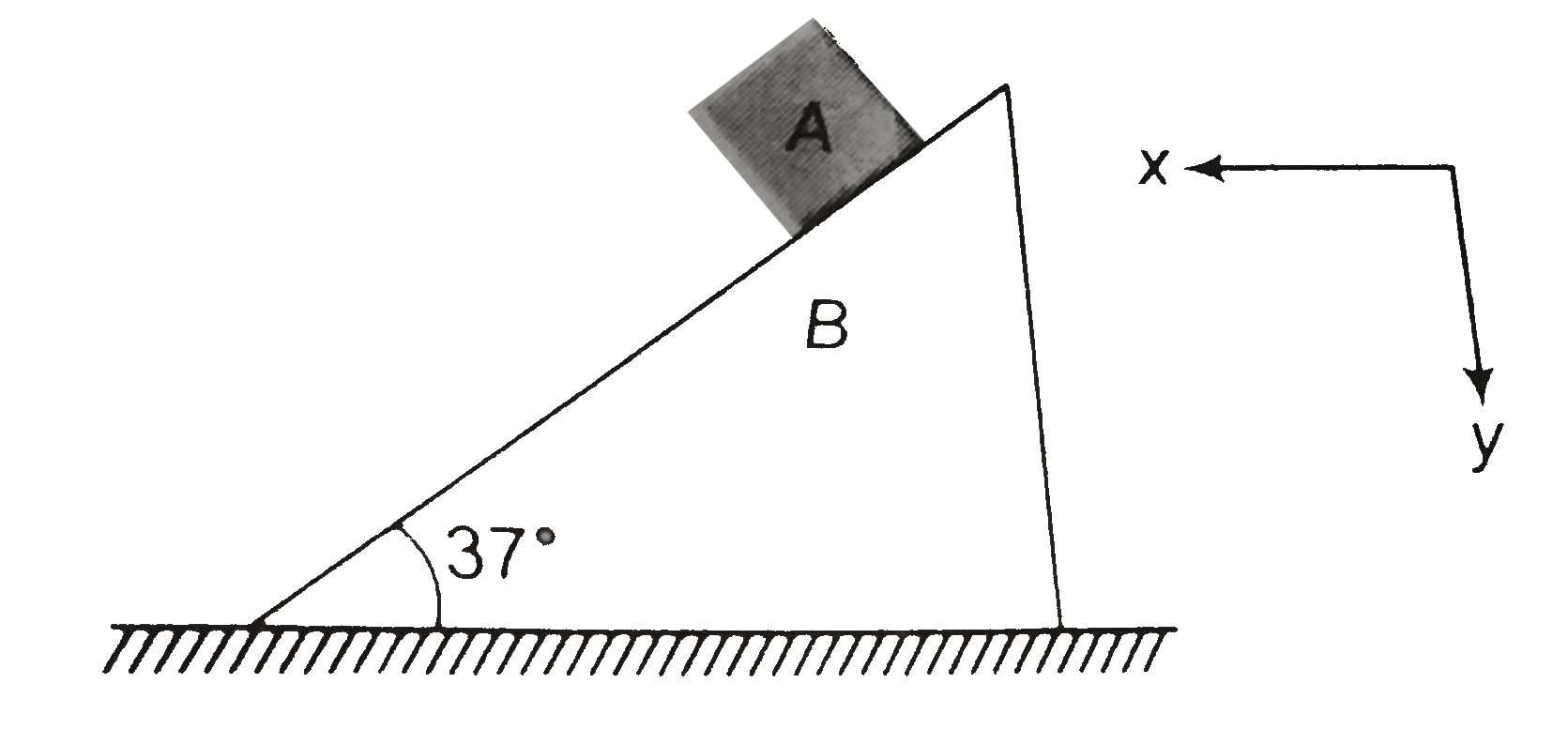 03:27View Solution
03:27View SolutionTwo blocks A and B each of mass m are placed on a smooth horizontal surface. Two horizontal force F and 2F are applied on blocks A and B, respectively, as shown in fig. Block A does not slide on block B. Then then the normal reaction acting between the two blocks is (assume no friction between the blocks)
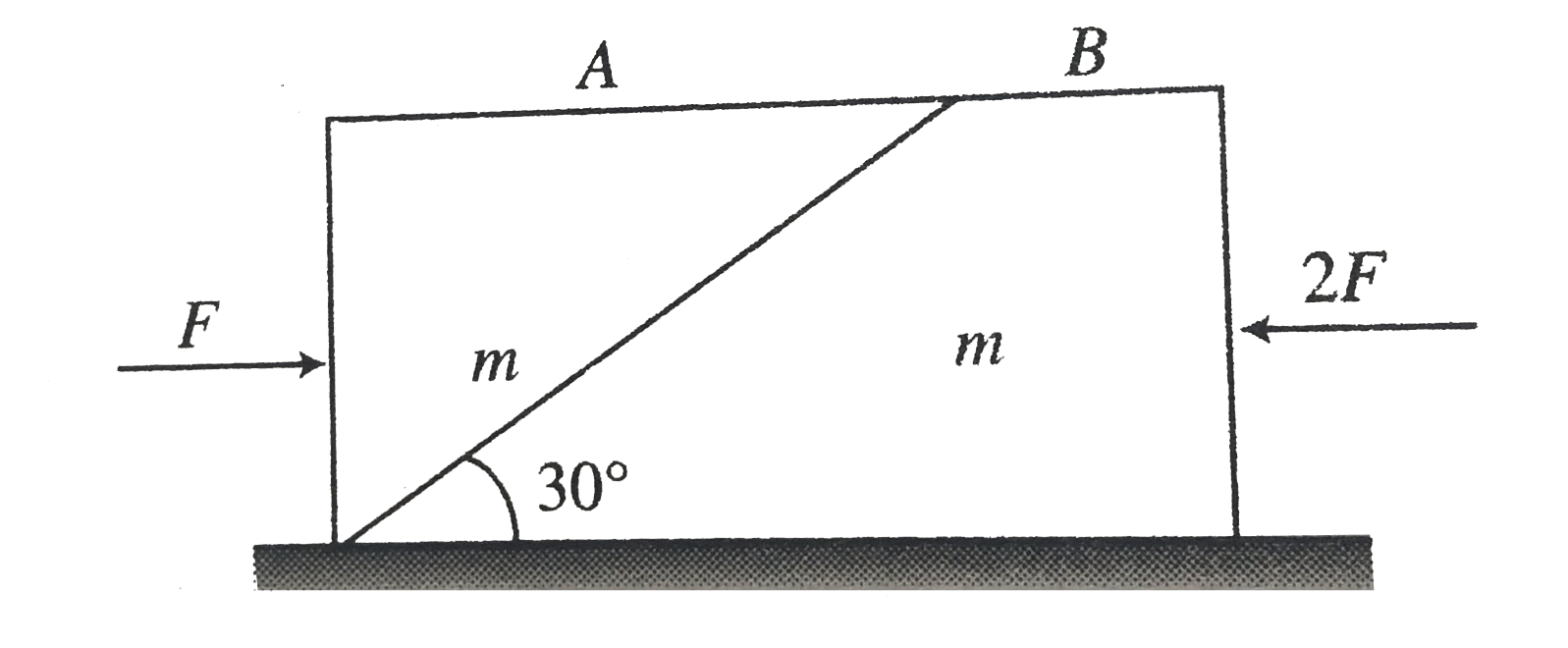 02:44View Solution
02:44View SolutionTwo block `A` and `B`move along a semicircular wire frame as shown in figure. The beads are connected by an inelastic string wich always remains tight . At an instant the speed of `A` is `u,/_BAC = 45^(@) and BOC = 75^(@)`,where `O` is the center of the semicircular are. The speed of bead `B` at that instant is
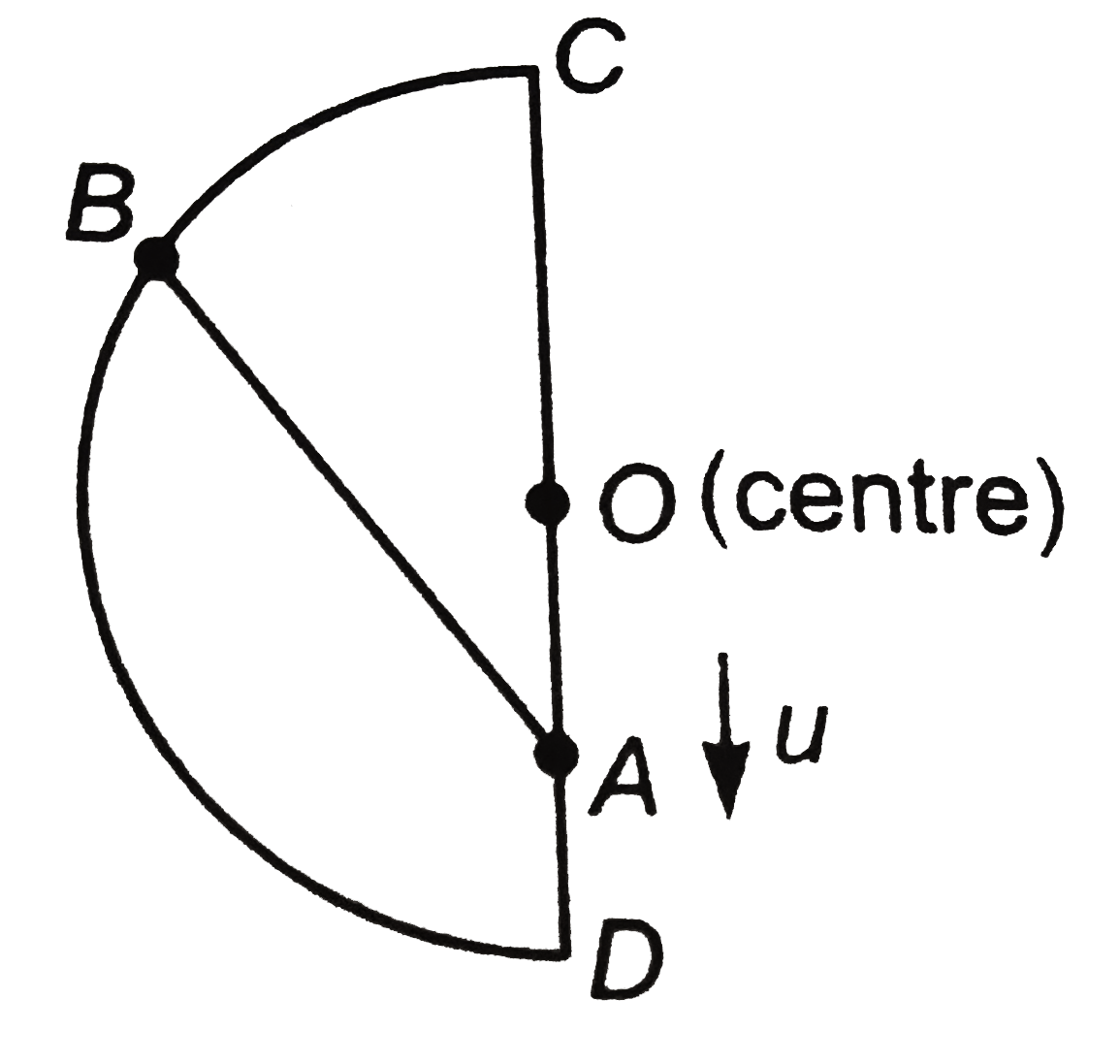 03:44View Solution
03:44View SolutionIf the coefficient of friction between `A` and `B` is `mu`, the maximum acceleration of the wedge `A` for which `B` will remain at rest with respect to the wedge is
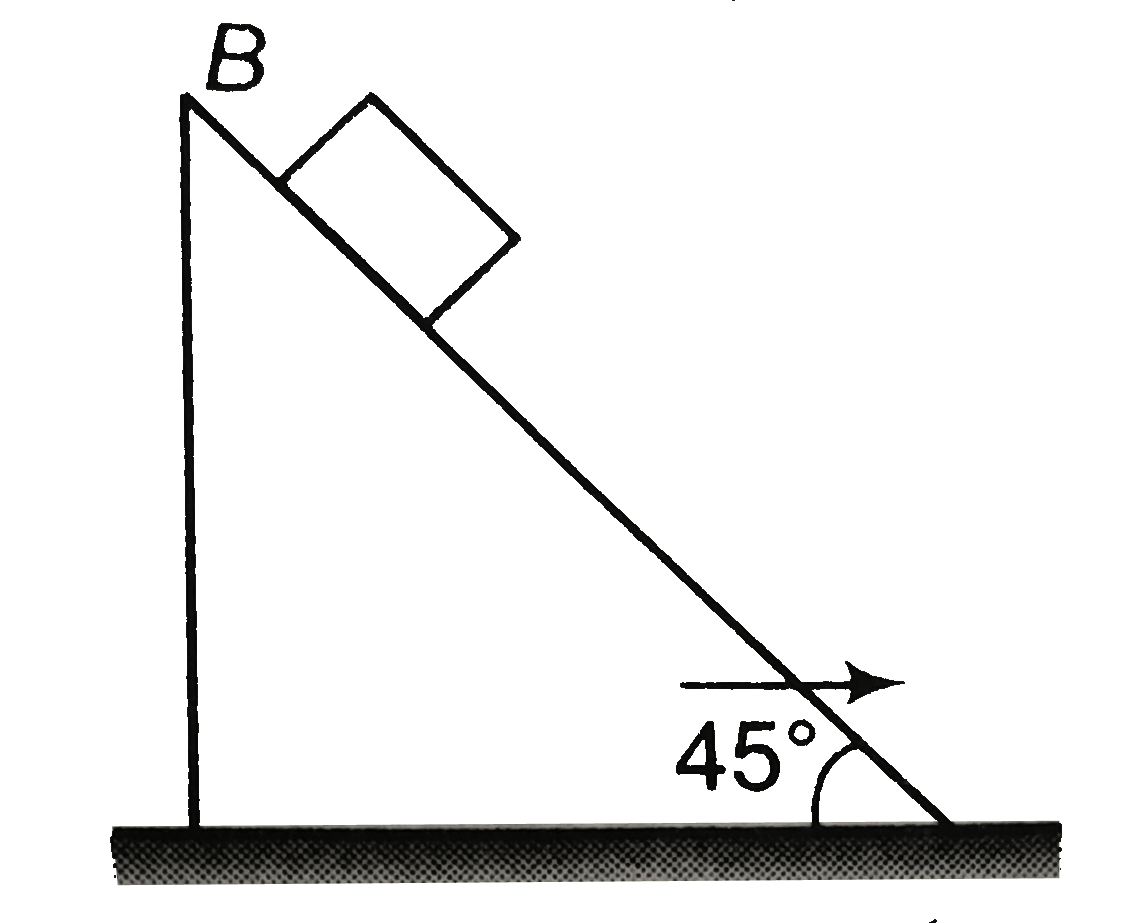 08:53View Solution
08:53View SolutionA livotad beam of negligible mass has mass suspended from one end and an Atwood's machine suspended from the other. The frictionless pulley has negligible mass and dimension. Gravity is directed downwards and `M_(2) = 3 M_(3)`,`l_(2) = 3 l_(1)` . Find the retio `M_(1)//M_(2)` which will ensure that the beam has no tedency to rotate just after the masses are released.
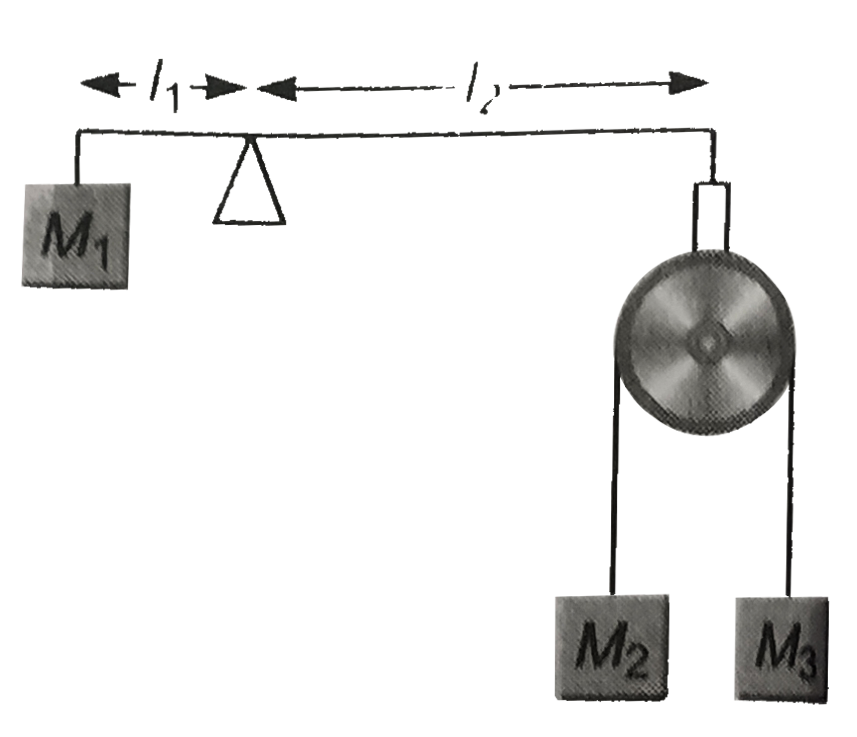 04:58View Solution
04:58View SolutionA block of mass `m` sides down an inclined right angled trough .If the coefficient of friction between block and the trough is `mu_(k)` acceleration of the block down the plane is
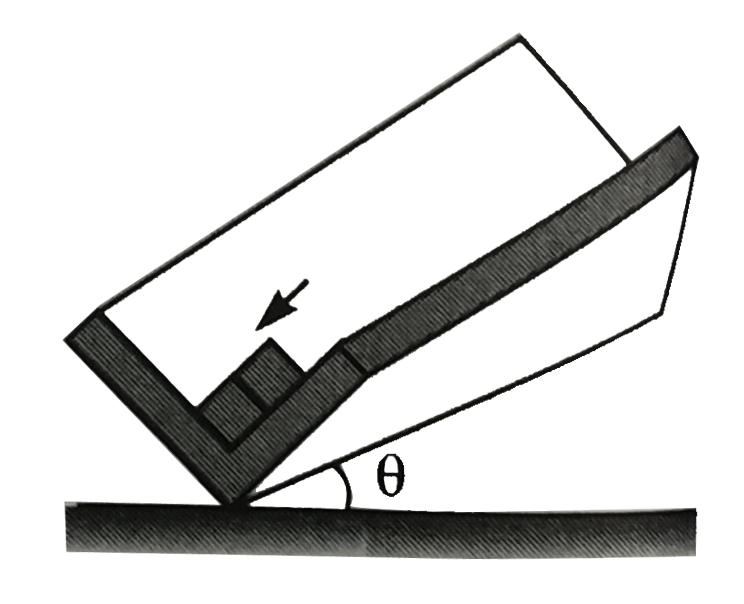 03:22View Solution
03:22View SolutionIf force F is increasing with time and at t=0, F = 0, where will slipping first start?
06:50View SolutionA plank of mass `2 kg` and length `1 m` is placed on horizontal floor.A small block of mass `1 kg` is placed on top of the plank , at its right extreme end .The coefficient of friction between plank and floor is `0.5` and that between plank and block is `0.2` . If a horizontal force `= 30 N` starts acting on the plank to the right ,the time after which the block will fall off the plank is `(g = 10 ms^(-2))`
05:17View SolutionThe block each of mass `1 kg` are placed as shown .They are connected by a string which passes over a smooth (massless) pulley.
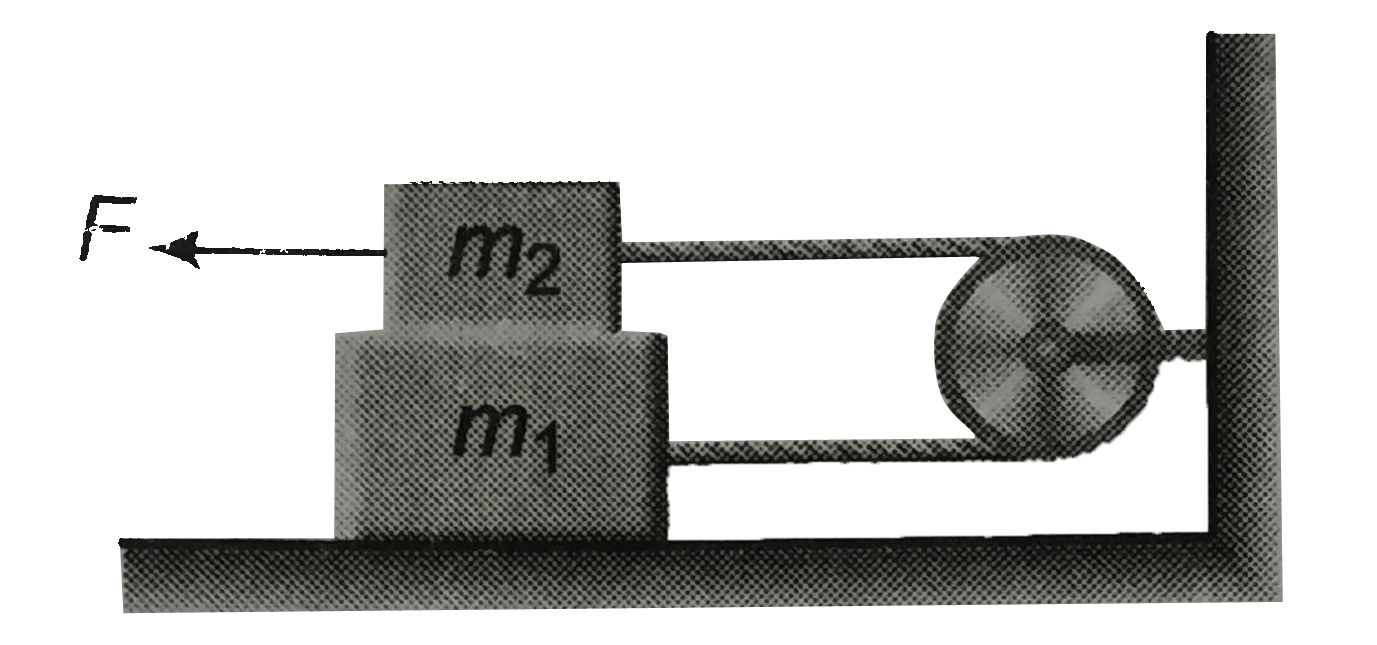
There is no friction between `m_(1)` and the ground.The coefficient of friction between `m_(1)` and`m_(2)` is `0.2 A` force `F` is applied to `m_(2)`. Which of the fpllowing statement is/are correct?04:30View SolutionTwo partical`A` and `B` each of mass `m` are kept stationary by applying a horizontal force `F = mg` on partical `B` as show in figure .Then
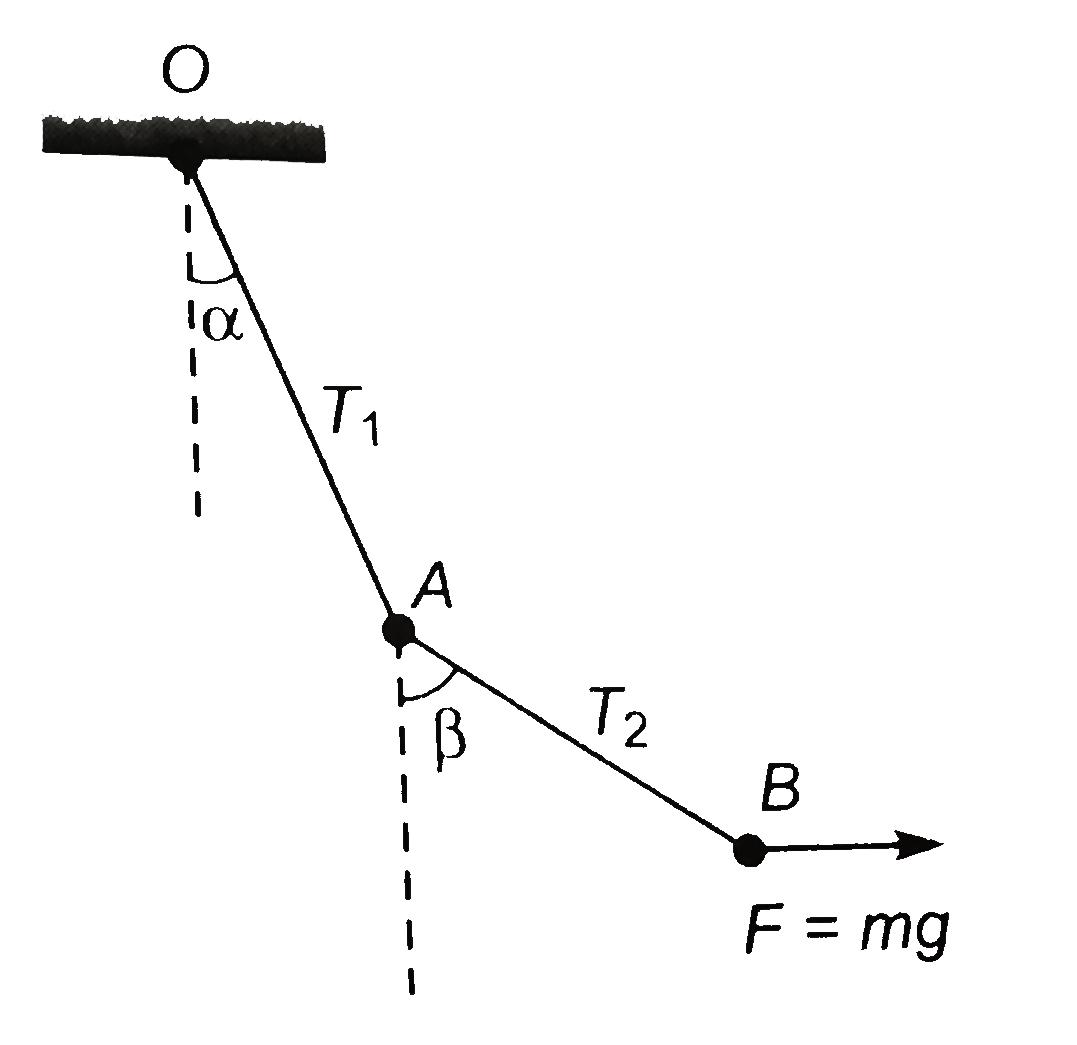 06:17View Solution
06:17View SolutionThe velocity- time graph of the figure shown the motion of a wooden block of mass `1 kg` which is given an intial push at `t = 0` along a horizontal table.
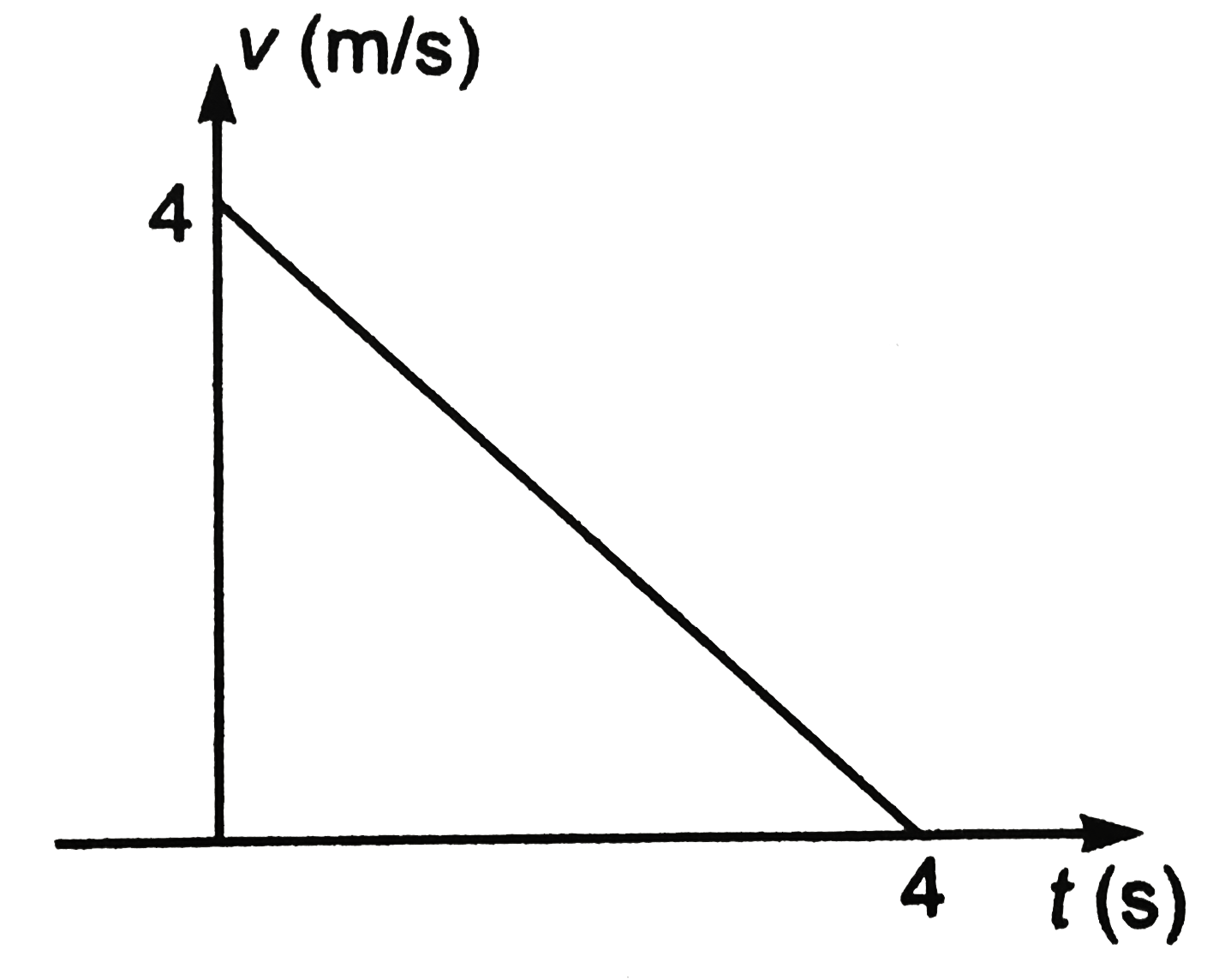 03:57View Solution
03:57View SolutionAs shown in figure, `A` is a man of mass `60 kg` standing on a block `B` of mass `40 kg` kept on ground. The coefficient of friction between the feet of the man and the block is `0.3` and that between `B` and the ground is `0.2` . If the person pulls the string with `125 N` force ,then
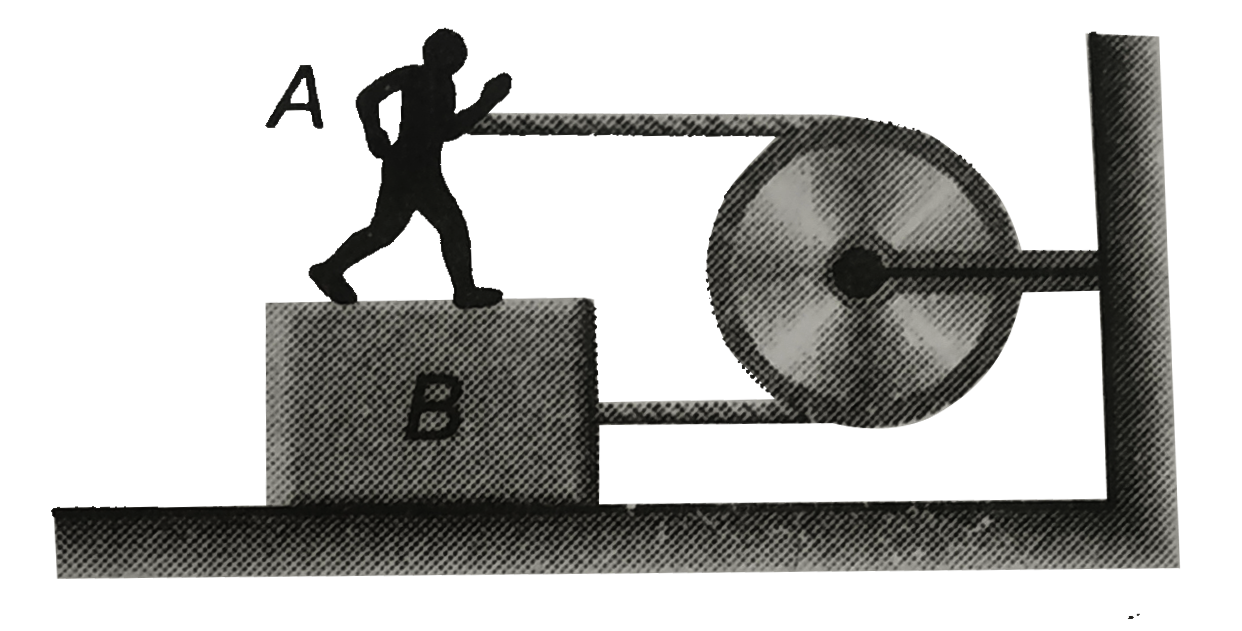 09:31View Solution
09:31View SolutionIn the figure shown `A` and `B` are free to move . All the surface are smooth. Mass of `A is m`. Then
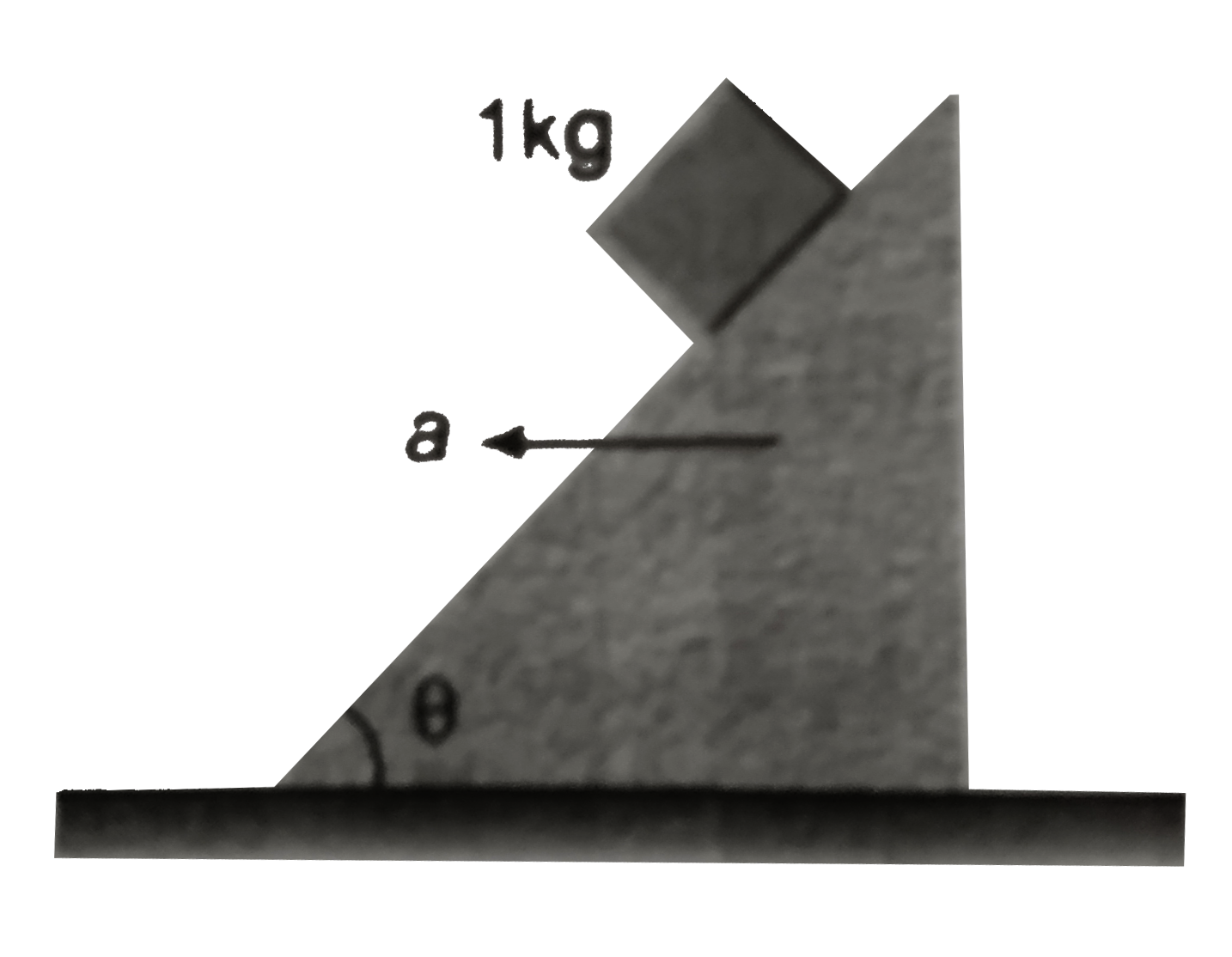 03:43View Solution
03:43View Solution`M_(A) = 3 kg ,M_(B) = 4 kg ,M_(C) = 8 kg`. Coefficient of friction between any two surface is `0.25` pulley is frictionless and string is massless .A is connected to wall through a massless right rod.
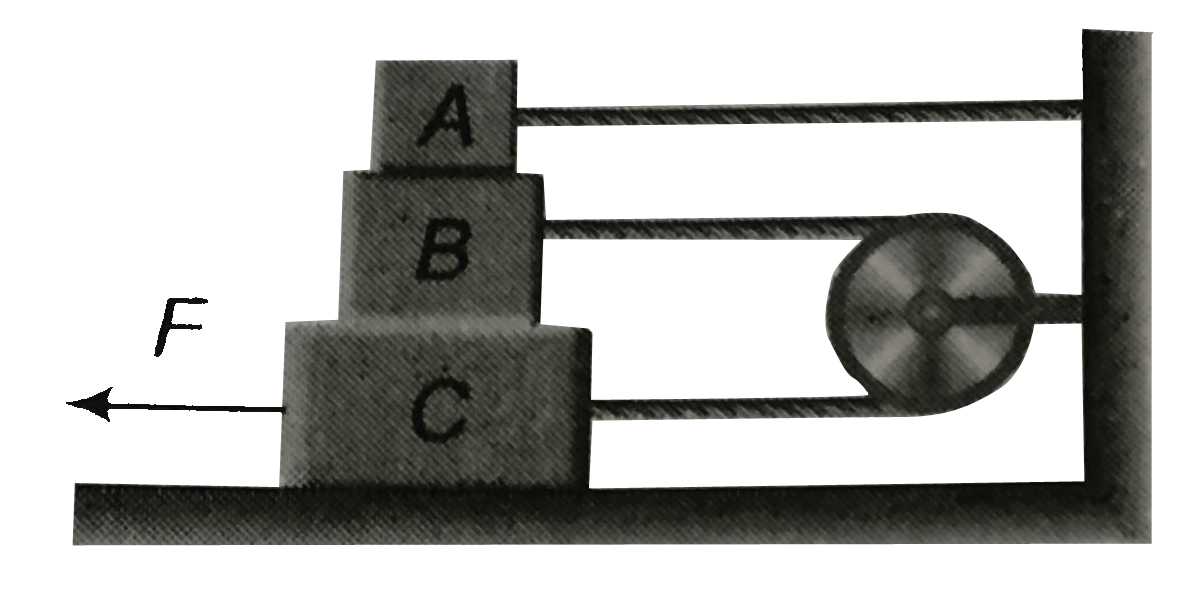 09:03View Solution
09:03View SolutionA man pulls a block of mass equal to himself with a light string .The coefficient of friction between the man and the floor is greater than that between the block and the floor
02:20View SolutionA block of mass `1 kg` is at rest relative to a smooth wedge moving leftwards with constant acceleration `a = 5 m//s^(-2)` .Let `N` be the normal reation between the block and the wedge . Then `(g = 10 m//s^(-2))`
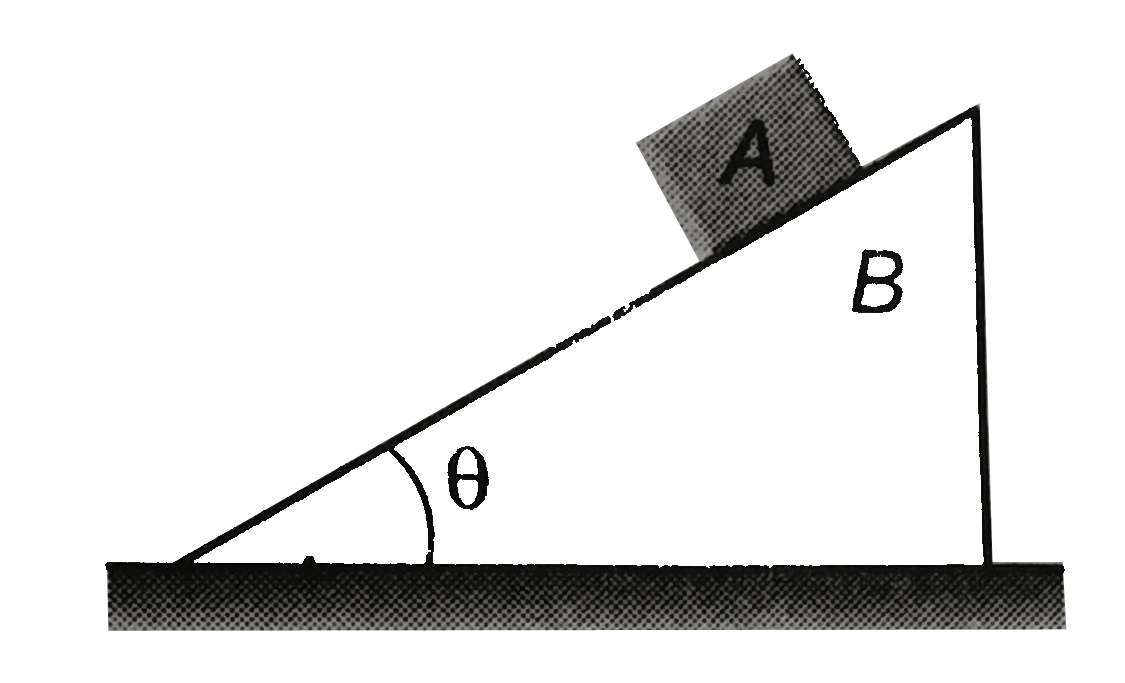 02:12View Solution
02:12View SolutionFor the given situation shown in figure , choose the correct option `(g = 10 m//s^(-2))`
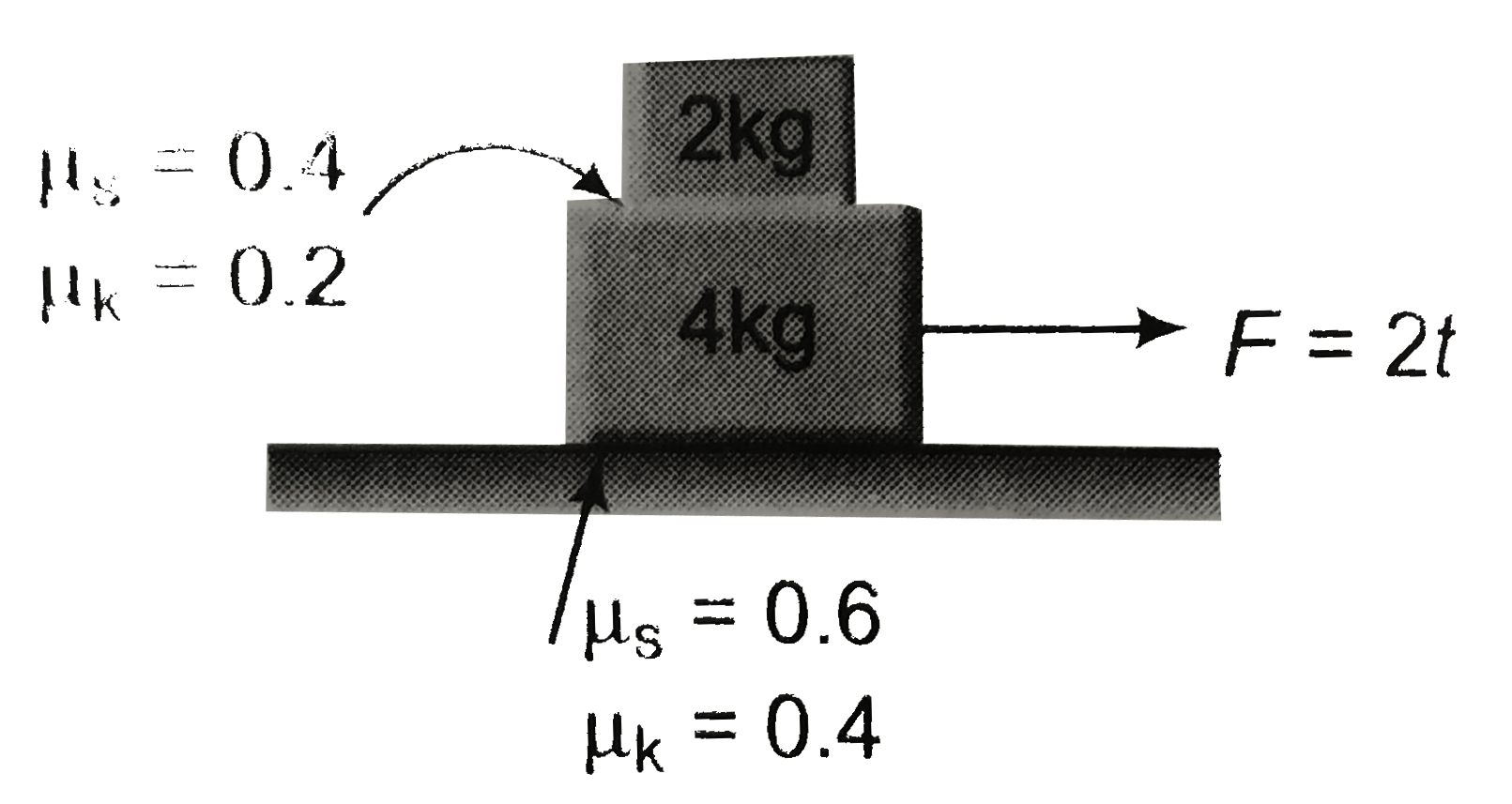 04:43View Solution
04:43View SolutionIn the figure shown , all the string are massless and friction is absent everywhere. Choose the correct options.
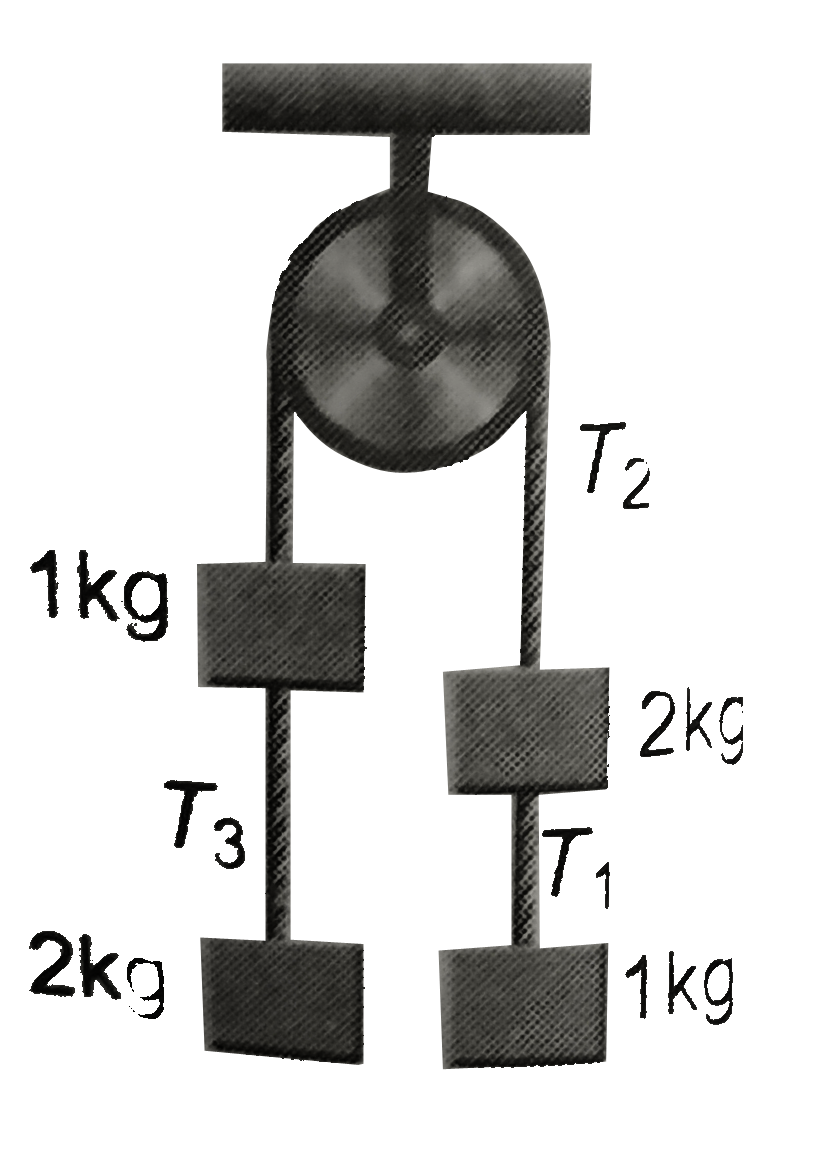 01:56View Solution
01:56View SolutionForce acting on a block versus time graph is as shown in figure Choose the correct options.`(g = 10 m//s^(-2))`
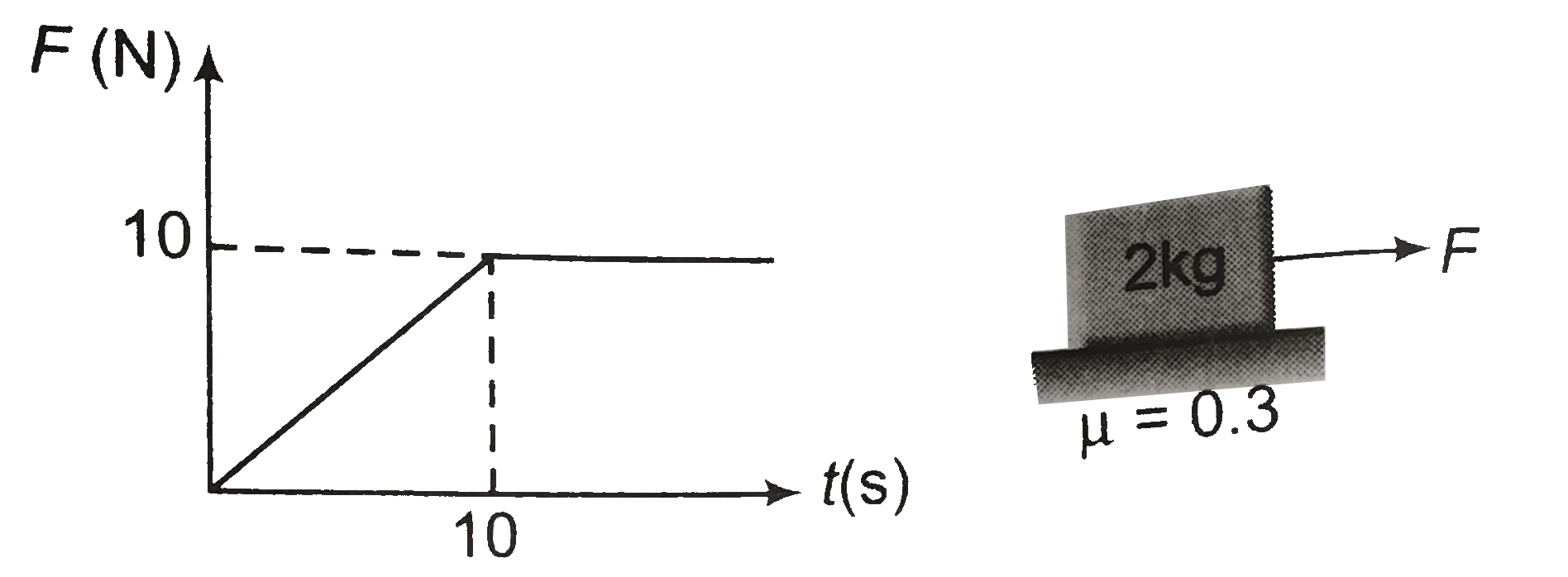 06:55View Solution
06:55View SolutionFor the situation shown in figure ,mark the correct options.
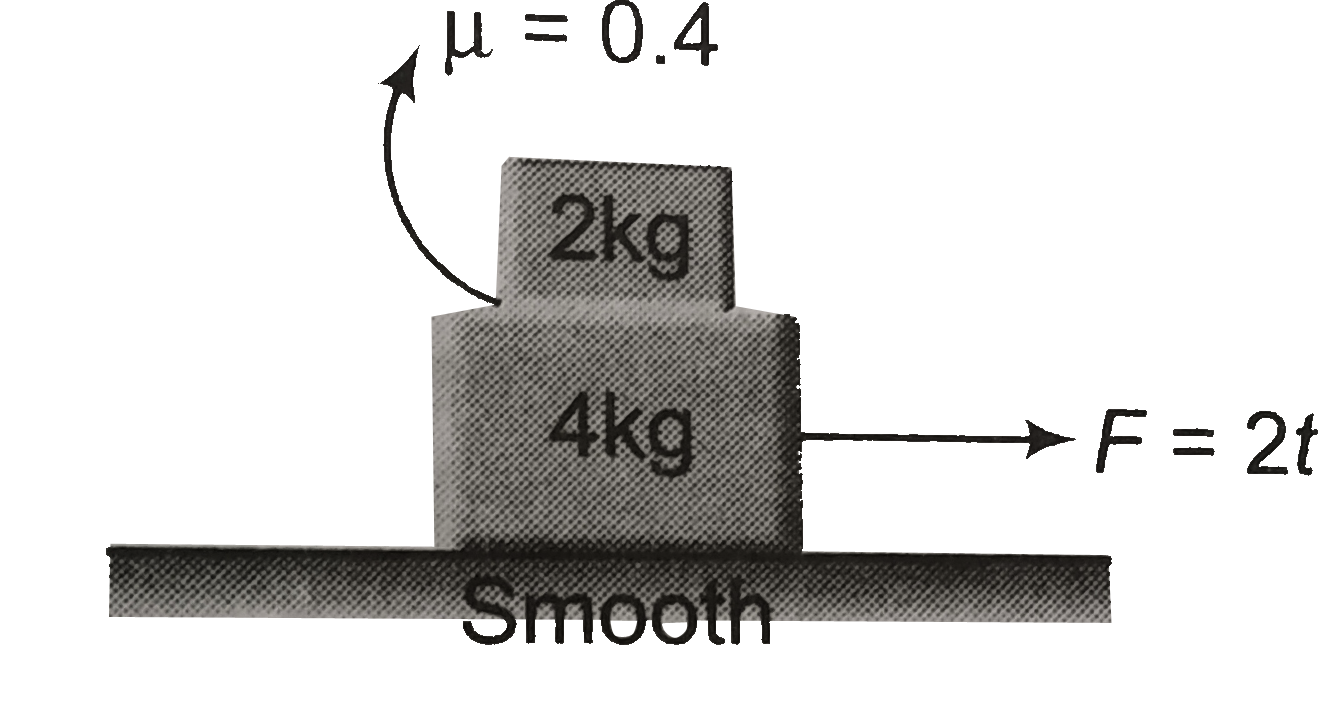 05:15View Solution
05:15View SolutionFor the situation shown in figure ,mark the correct options.
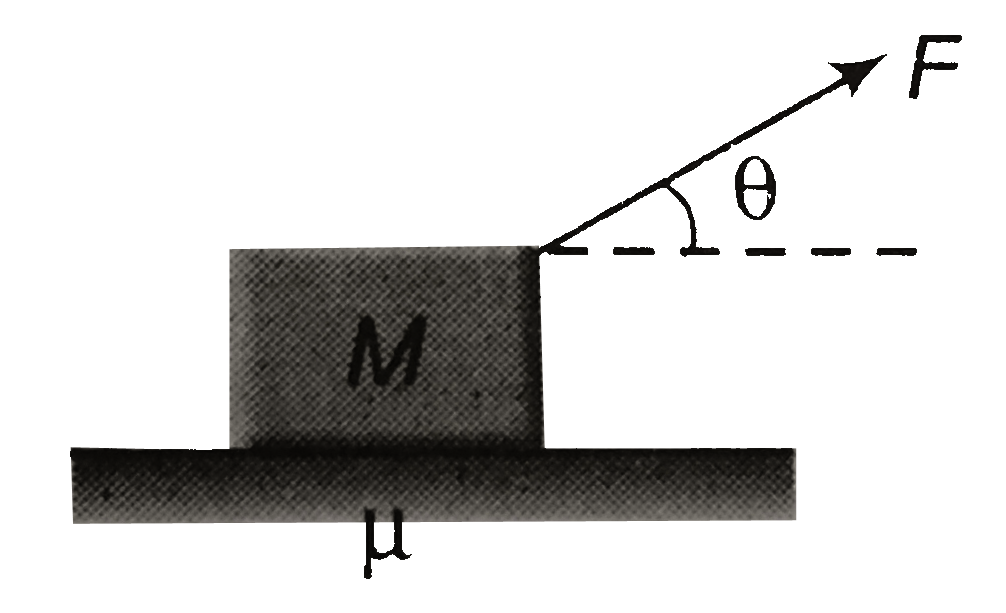 02:42View Solution
02:42View Solution
Objective Question questions and complete solutions for chapter LAWS OF MOTION of DC PANDEY PHYSICS (HINGLISH) of Class 11
All Exercises from DC PANDEY Class 11 PHYSICS LAWS OF MOTION
- Chapter exercises (A) Taking it together
- Check point 5.1
- Check point 5.2
- Check point 5.3
- Check point 5.4
- Comprehension
- Exercise 8.1
- Exercise 8.2
- Exercise 8.3
- Exercise 8.4
- Exercise 8.5
- Match the columns
- Medical entrances gallery
- Miscellaneous Examples
- Objective Question
- Single Correct
- Solved Examples
- Subjective Question
